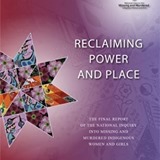 Chapter 11: Valuing Lived and Front-line Experiences
Chapter 11: Valuing Lived and Front-line Experiences
Between October and December 2018, the National Inquiry hosted four Guided Dialogues to identify best practices to increase safety, well-being, and the rights of Indigenous women, girls and 2SLGBTQQIA people in Canada. These were held in four locations across Canada and brought together front-line service providers and community organizers. This chapter deals with emerging themes and recommendations.
Promoting Empowering Research and Representation: Recommendations included culturally specific data differentiating Inuit, Metis and First Nations victims; more data on gender options and diversity; and more research into patterns of violence and systemic discrimination. Concern was expressed that Indigenous communities were over-researched without sufficient implementations of recommendations. More equitable representation was called for, especially for the gender diverse, as well as meaningful collaboration and gender-based analysis.
Core Principles and Values for Safety: Wellness as wholeness was emphasized, taking into account mental, physical, emotional, and spiritual needs, and seeing individuals within a web of interdependent and interactive relationships. The Indigenous world view emphasizes the interconnected nature of life. The right to language is foundational to culture, connecting people to their land, laws, and ancestors. Community-held values was lost with the oral tradition of storytelling.
Exploring Safety through Four Key Themes: All recommendations were to be related to the four key rights areas encapsulated in the Final Report, i.e Culture, Health, Security, and Justice.
Culture as a Critical Source for Safety: Access to culture was seen as a fundamental right and top priority to reduce risks of violence. Land, language and teachings, family and community were identified as critical sources of support. Families can suffer from increased consumerism, social isolation, decreased resiliency, less respect for Elders, and lateral violence. Different perspectives exist within Indigenous communities on gender identity and sexual orientation. Inclusion needs to be supported.
Health and Wellness: Mental health services and substance use treatment are critical to supporting family well-being. Discrimination and gaps in service were identified as key inequities. Best practice recommendations include mobile outreach clinics, local capacity building, increased support for newcomers in urban centers, increased aftercare, affordable long-term therapy, culturally grounded programs, dedicated funds for healing from the impact of colonialism, support for the whole family, increased support for Indigenous midwives, specialized services for 2SKGBTQQIA, and mentorship programs for men and boys.
Human Security Issues: Marginalization is a product of colonialism and colonization and results in poverty, unemployment, and insecure housing. All of these need to be addressed, including shelters, subsidized housing, transitional housing, mixed gender shelters, and dedicated 2SLGBTQQIA housing. Shelter is basic human right. Strengthened educational services and supports for youth were also recommended.
Justice: Many issues exist within policing, justice, and corrections from insufficient capacity to discrimination. Recommendations include improved law enforcement, expanded preventative community-based models, improved victim support services, culturally grounded restorative programs, rehabilitation supports, programs for individuals transitioning back from correctional facilities, and dedicated 2SLGBTQQIA support services.
Conclusion: Making Connections: The Guided Dialogue discussions sought to bridge testimony received by the National Inquiry with actionable and impactful recommendations.
Calls for Justice: “As the evidence demonstrates, human rights and Indigenous rights abuses committed and condoned by the Canadian state represent genocide against Indigenous women, girls, and 2SLGBTQQIA people. These abuses and violations have resulted in the denial of safety, security, and human dignity. They are the root causes of violence… which Indigenous people are forced to confront on a daily basis and where perpetrators act with impunity.” (p.167)
“The steps to end and redress this genocide must be no less monumental than the combination of systems and actions that has worked to maintain colonial violence for generations. A permanent commitment to ending this genocide requires addressing the four pathways explored within this report, namely:
-
-
- historical, multigenerational, and intergenerational trauma;
- social and economic marginalization;
- maintaining the status quo and institutional lack of will; and
- ignoring the agency and expertise of Indigenous women, girls, and 2SLGBTQQIA people. (p.167)
-
A series of “Calls for Justice” follow which are described as legal imperatives based on international and domestic human and Indigenous rights laws. This will be discussed in the next section.

